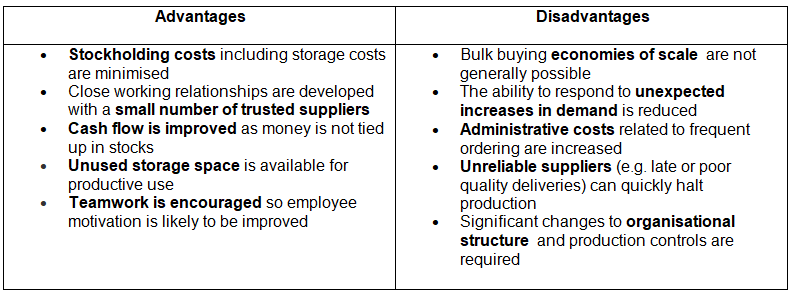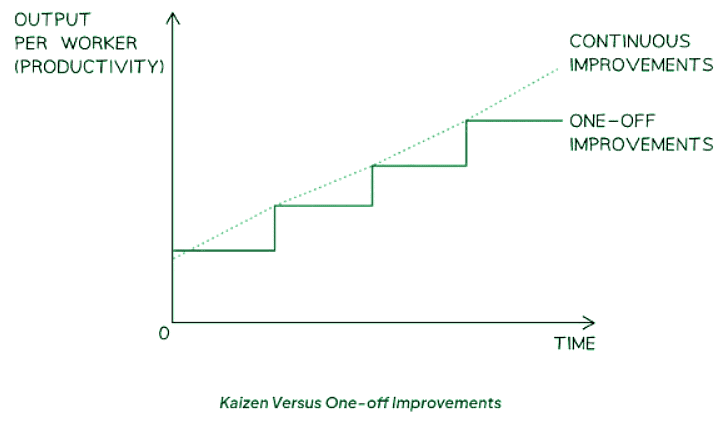Class 10 Exam > Class 10 Notes > Business Studies for GCSE/IGCSE > The Concept of Lean Production
The Concept of Lean Production | Business Studies for GCSE/IGCSE - Class 10 PDF Download
Lean Production
- Lean production aims to minimize production resources, resulting in:
- Reduced time through efficient organization of the production process.
- Decreased material usage by focusing on waste reduction.
- Lower labor requirements, as lean production often relies on capital-intensive methods.
- Reduced production space through just-in-time stock management.
- Collaboration with a small number of trusted suppliers.
- Adopting lean production can confer a competitive advantage by:
- Achieving lower unit costs due to minimal wastage, potentially offering lower prices than competitors.
- Enhancing output quality through dependable suppliers and carefully managed production processes.
- Lean production employs strategies like just-in-time stock control and Kaizen.
Just in Time Stock Control
- Just in Time (JIT) stock management is a system where raw materials are not stored onsite but are ordered as needed and delivered by suppliers precisely when required for production.
- Effective implementation of JIT necessitates meticulous coordination to ensure timely delivery of raw materials and components from suppliers:
- Establishing close relationships with suppliers is crucial.
- Suppliers may need to be located nearby to facilitate prompt delivery.
The Advantages and Disadvantages of Just in Time Stock Management

Continuous Improvement (Kaizen)
Kaizen entails a continuous approach to enhancing productivity by eliminating all forms of waste in the production process.
- Its methodology involves making small, ongoing changes rather than significant one-time adjustments.
- These modifications are consistently assessed to ensure they deliver the intended positive impact on productivity.
- Successful implementation of Kaizen necessitates long-term management commitment to change.

- Key aspects of Kaizen typically involve:
- Striving for zero defects in manufacturing processes.
- Implementing high levels of automation.
- Fostering strong cooperation between workers and management.
- Staff training and computerized inventory management systems can further diminish wastage by minimizing the occurrence of errors.
The Benefits of Implementing Lean Production
- Right First Time Approach
- Aims to achieve zero defects in output by getting things right from the start.
- Focuses on identifying and solving problems as they arise rather than correcting errors later.
- Flexibility
- Includes having multiskilled staff and promoting teamwork.
- Utilizes flexible management styles to adapt to changing circumstances.
- Waste Minimization
- Eliminates processes that do not add value to the final product.
- Ensures that resources are used efficiently and as minimally as possible.
- Effective Supply Chain Management
- Establishes strong relationships with suppliers.
- Minimizes the number of suppliers to streamline operations.
- Continuous Improvement
- Encourages ongoing small steps towards better processes.
- Involves all staff in identifying areas for improvement.
Question for The Concept of Lean ProductionTry yourself: What is the main objective of lean production?View Solution
The Elimination of Seven Wastes in Lean Production
- Waste in lean production refers to anything that hinders a business from operating efficiently.
- Seven fundamental types of waste are significantly reduced in lean production practices.
- Transportation: Involves unnecessary movement of materials or products from one location to another.
- Inventory: Relates to excessive amounts of raw materials, work-in-progress, or finished goods stored within the production system.
- Motion: Refers to any unnecessary movement of people or equipment that does not add value to the process.
- Waiting: Denotes delays or idle time that occurs during the production process, leading to inefficiencies.
- Overproduction: Entails manufacturing more products than what is actually required by the end customer, resulting in surplus inventory.
- Overprocessing: Involves using more resources than necessary to produce a specific product, leading to wastage.
- Defects: Occur when products or services do not meet the quality standards or requirements of the customer.
The document The Concept of Lean Production | Business Studies for GCSE/IGCSE - Class 10 is a part of the Class 10 Course Business Studies for GCSE/IGCSE.
All you need of Class 10 at this link: Class 10
|
70 videos|93 docs|26 tests
|
FAQs on The Concept of Lean Production - Business Studies for GCSE/IGCSE - Class 10
| 1. What are some of the benefits of implementing Lean Production? |  |
Ans. Some of the benefits of implementing Lean Production include increased efficiency, reduced waste, improved quality, lower production costs, and enhanced customer satisfaction.
| 2. How can Lean Production help businesses become more competitive in the market? |  |
Ans. Lean Production can help businesses become more competitive in the market by streamlining processes, reducing lead times, and increasing productivity, which ultimately leads to cost savings and improved customer satisfaction.
| 3. What is the concept of Lean Production and how does it differ from traditional production methods? |  |
Ans. Lean Production is a methodology focused on maximizing value while minimizing waste in the production process. It differs from traditional production methods by emphasizing continuous improvement, employee involvement, and the elimination of non-value-added activities.
| 4. What are some common challenges businesses face when implementing Lean Production? |  |
Ans. Some common challenges businesses face when implementing Lean Production include resistance to change, lack of employee buy-in, difficulty in measuring results, and the need for ongoing training and support.
| 5. How can businesses ensure successful implementation of Lean Production principles? |  |
Ans. To ensure successful implementation of Lean Production principles, businesses should create a culture of continuous improvement, provide adequate training and support to employees, set clear goals and objectives, and regularly monitor and evaluate progress.
Related Searches
















